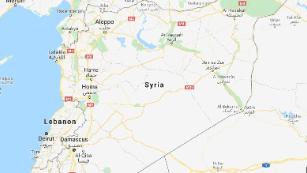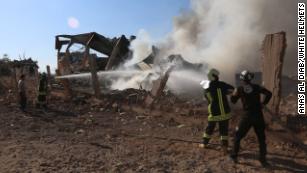Pentagon questions presence of Russian warships off Syrian coast
By Ryan Brown, CNN

Washington (CNN)The Pentagon is monitoring and questioning the presence of over a dozen Russian Navy warships that are currently deployed in the Eastern Mediterranean, within striking distance of Syria.
The presence of the Russian warships comes as US officials tell CNN that US intelligence assesses that Moscow's Syrian allies have carried out airstrikes against medical facilities in Idlib, one of the few remaining rebel held areas in the country.

US backed forces begin Syria battle for ISIS' last redoubt
The Russian Navy "has been steadily building a large contingent of naval assets close to Syria with more than a dozen ships, many of those KALIBR-missile-equipped," Pentagon spokesman Eric Pahon told CNN referring to the Russian-made cruise missile.
NATO officials have also expressed concern about the presence of the Russian warships saying that allied vessels in the region from the Netherlands, Canada, Greece and Spain have were keeping a close eye on their Russian counterparts.
While Russia's Ministry of Defense had said that the naval deployment of some 26 ships and 34 aircraft was in order to conduct a military exercise, the US Department of Defense questioned why the Russian assets remained after the exercise ended.
"The Russians claimed this was to conduct a military exercise, which they have announced has concluded. The question remains, then, why is Russia's naval presence still elevated in the region? Is there another reason?" Pahon said.
US officials have expressed concerns that the Russian warships could carry out missile strikes in support of the Assad regime's offensive against Idlib.
Airstrikes on medical facilities
US officials told CNN Thursday that the US had determined that regime airstrikes hit three buildings that correspond to the location of medical facilities.
The US assessment corresponds with recent statements made by NGOs including the Syrian Civil Defense group the White Helmets and the international group, the Union of Medical Care and Relief Organizations, both of which have accused the regime of striking medical facilities.
The UN's Office for the Coordination of Humanitarian Affairs issued a report Wednesday documenting some of the alleged airstrikes against hospitals.

Rescuer hit in airstrike keeps filming to capture the horror in Syria's Idlib
"Numerous attacks on civilian infrastructure, including hospitals and schools, in north-west Syria have been reported so far in September," the report said.
The report said the alleged attacks included a September 6 airstrike against a "NGO-supported hospital" that "caused major structural and equipment damage."
The UN report said that the location of that hospital had been "shared with the parties to the conflict to ensure that they are not part of military considerations."
The targeting of hospitals is considered a war crime.
On Tuesday, US Ambassador to the United Nations Nikki Haley warned the Syrian regime and Russia of "dire consequences" if they continue airstrikes against the last rebel-held area in Syria and the UN Secretary General Antonio Guterres warned of a potential "bloodbath" during the UN Security Council meeting on the crisis in Idlib.

'We are not Libya': Defiant Damascus seeks new dawn amid the rubble
"If Assad, Russia and Iran continue down the path they are on, the consequences will be dire," she said, accusing the Syrian regime of using "barrel bombs, rockets and artillery" as part of its offensive.
"The United States is long past taking Russia and Iran at their word that they are genuinely interested in protecting civilians in Idlib from further violence," Haley said. "No matter what type of weapons or methods are used, the United States strongly opposes any escalation of violence in Idlib."
"Fighting terrorism does not absolve warring parties of their core obligations under international law," Guterres said while also directly appealing to Iran, Russia and Turkey to spare no effort to protect civilians, "preserve basic services such as hospitals, ensure full respect for international humanitarian law."



Hakuna maoni: